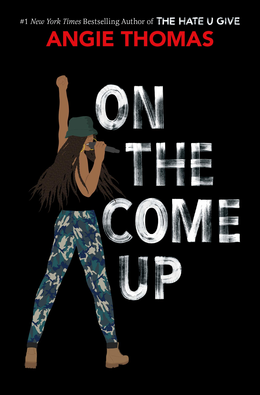Arnoldus: Why Angie Thomas’ New Book is “On the Come Up!”

Following the success of “The Hate U Give”, author Angie Thomas published “On the Come Up.”
February 20, 2020
Angie Thomas has done it again. Her debut novel, “The Hate U Give,” became a #1 New York Times Bestseller, touching the hearts of many with its lovable characters and politically relevant commentary about the prevalence of police brutality in the African American community. “The Hate U Give” was a life-changing book for me. The way Angie Thomas handled such politically sensitive issues with such grace of language and relatability gave her writing a kind of potency that I’d never seen before. I found myself getting attached to the characters and crying when they cried. The film adaptation gave the story a whole new platform to traverse, and since then its impact is only growing. She’s done it again with her new novel “On the Come Up.” Set in the same universe but with different characters, she’s illuminated the political scene once again with her fresh social commentary woven into the life of her new protagonist: Brianna Jackson.
Brianna is a sixteen-year-old aspiring rapper who lives in the shadow of her late father, whose rap name was Lawless. Her struggle to escape the stereotypes and racial profiling imposed upon her by society are mirrored by her struggles to escape the legacy of her father. Instead of letting her have her own unique identity, many of her peers peg her as “Lil Lawless,” reducing her identity to nothing but a second-rate version of her father. Although Bri appreciates her father’s music, she doesn’t fit the stereotype that the industry tries to push on her-one of a hoodlum, a troublemaker, a negative archetype of a young African American woman.
Every encounter Bri has with racism is followed by a reaction, which Thomas takes care to justify. Bri’s internal dialogue reveals to us not just Bri’s motivations for acting out, but also the deeper mechanisms at play in the African American community. For example, when Bri is harassed at her school by two security officers, she writes a rap with allusions to guns and violence. In the song, she talks about how others view her and other people of color at her school. This is misconstrued when various organizations and the media get involved, as often happens in today’s political climate. Bri is misunderstood and is trying to create unifying, important music. Thomas has a gift for taking big, hot-topic issues down to the personal level, and she does that masterfully throughout “On the Come Up.”
Thomas uses modern diction and slang throughout the book, and it shocked me upon first reading because it felt like the book had been written yesterday. Its up-to-dateness will either age the book in the future or make it a historical work that will be studied when future students try and understand today’s political climate. I can see Thomas’ writing being studied in history and anthropology classes because that’s how reflective they are of the human experience, the Gen Z experience and the experience of African Americans in today’s world of mass media.
I would argue that in a lot of ways, “On the Come Up” was even better than Thomas’ debut novel because it showcased a wider array of experiences in the African American community, while “The Hate U Give” focused more on specific issues of code-switching, microaggressions, police brutality, etc. “On the Come Up” has no shortage of characters to give us, the readers, valuable insight into the lives of different personalities within the African American community. I think that Thomas intentionally set this novel in the same neighborhood as her first book because she wanted to teach the readers that not everyone who grows up in the same neighborhood has the same experience, which is an important lesson within itself.
For example, Thomas illustrates the life of Sonny: the homosexual, African American best friend of Bri. Sonny uses photography as an outlet, and as a voice to say what he cannot say in words. Malik, her other best friend, does the same with filmmaking. Bri expresses herself through rapping. This is exemplified when they make a music video together explaining the meaning behind Bri’s rap. Thomas shows how art is the voice that disenfranchised groups use to communicate their message to the world. Thomas debunks some of the biggest stereotypes surrounding rap music and rappers, including gang affiliation, the “hoodlum” image and its unsafe messages. Thomas shows that rap can be a voice for groups that don’t have one, and can bring unity, not division, to a community. She talks about the necessity of this in a community divided, and uses Bri, the protagonist and all around well-intentioned person, to bring a face to the cause. Thomas, a rapper herself, takes us into the mind of a rapper and shows how Bri’s experiences directly translate into her rap music.
This book showcases the lives of so many groups of people: gay, straight, young, old, women and men. In many ways, Thomas’ writing is like Bri’s rapping- it’s a voice for those groups that don’t have one, in this case the African American community. The book doesn’t outright address the stereotypes, racism and brutality that the African American community faces, but instead displays the African American perspective as seen through the eyes of Bri. For example, Bri’s mother is a recovering addict, and many people in her life, including her mother-in-law, attempt to blame her for her addiction and antagonize her for it. We learn through the plotline that Bri’s mother only got addicted after her husband was killed, and she had no other way to cope. She found the strength to get clean and reclaimed her family. Seeing this issue from the perspective of her mother brings drug addiction, a widespread and highly misunderstood issue, to a personal level, and makes it easy for all audiences to digest the message.
Bri’s family also struggles with poverty, and she has to make a personal decision whether to compromise her morals for money. In the end, the choice isn’t that simple, but it helps the reader understand crime as a result of poverty and systematic oppression, not inherent evil.
I read this book for WILL, or Women Influencing Lives Through Literature, a book club and mentorship program I co-lead at Columbus Middle School. At WILL, we try and pick books that will be impactful to these young women, and that will give them role models to look up to. Bri can be understood as a woman of color protagonist that can and will inspire those who read the book to follow in her footsteps, not necessarily with rapping but on her path of battling racism.
This book is not only important for African American women to read but also for people of all cultures. I’ve been taking extra steps to educate myself about communities besides my own, and this Black History Month I feel that I’ve gained an insight to a world that I live in proximity to but not in. Bri’s story tells us that anyone can be a pioneer for their community, and that everyone has a voice, whether they know it or not. This book changed my perspective on gun violence, gang activity, systematic oppression, and drug addiction in the way that all writers hope to- by connecting with the reader. Thomas reminds us of our common humanity, and her novel invites everyone to the conversation.









